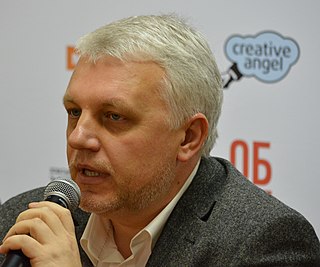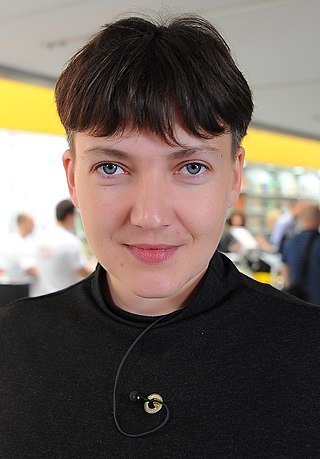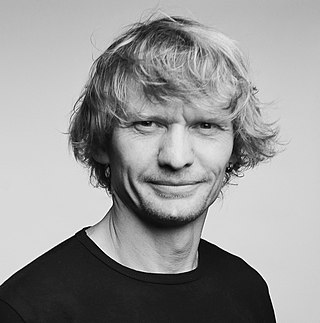
Radio Free Europe/Radio Liberty (RFE/RL) is an American government-funded international media organization that broadcasts and reports news, information, and analyses to Eastern Europe, Central Asia, the Caucasus, and the Middle East. RFE/RL is a private 501(c)(3) corporation and is supervised by the U.S. Agency for Global Media, an independent government agency overseeing all international broadcasting services that receive American government support. Nicola Careem is the organization's editor-in-chief.

The Kyiv TV Tower is a 385 m-high (1,263 ft) lattice metal tower on Oranzhereina Street, Kyiv, Ukraine, and is the tallest structure in the country. The tower was built in 1973 while Kyiv was the capital of Ukrainian SSR. The tower was the tallest freestanding metal structure in the world It is used for radio and television broadcasting and is not open to the public. It is the tallest lattice tower in the world and sixth tallest structure in Europe.

Román Skrýpin is a Ukrainian media manager, journalist, television host, a chief of the Ukrainian independent media union.

Pavel Grigorievich Sheremet was a Belarusian-born Russian and Ukrainian journalist who was imprisoned by the government of Belarus in 1997, sparking an international incident between Belarus and Russia. The New York Times has described him as "known for his crusading reports about political abuses in Belarus" and "a thorn in the side of Lukashenko's autocratic government". He was awarded the Committee to Protect Journalists' International Press Freedom Award in 1999 and the Organization for Security and Co-operation in Europe's Prize for Journalism and Democracy in 2002.

Nadiya Viktorivna Savchenko is a Ukrainian politician, former Army aviation pilot in the Armed Forces of Ukraine and former People's Deputy of Ukraine.

Olena Vasilivna Chekan was a Soviet and Ukrainian film actress, script writer and journalist.

Stanislav Volodymyrovych Aseyev is a Ukrainian writer and journalist, human rights activist, and founder of the Justice Initiative Fund. Serviceman of the Armed Forces of Ukraine. His best-known work is the novel The Torture Camp on Paradise Street (2020). In May 2014 his native city of Donetsk fell under the control of Russian militants and he remained there. From 2015 through 2017 Aseyev published his reports for the Mirror Weekly newspaper and other Ukrainian media. On 2 June 2017, he disappeared. On 16 July, an agent of the Ministry of State Security of the Donetsk People's Republic (DPR) confirmed that he was kidnapped by militants from the DPR.

Arkady Arkadyevich Babchenko is a Russian print and television journalist, From 1995, Babchenko served in the communication corps in the North Caucasus while participating in the First Chechen War. He later volunteered for six months during the Second Chechen War. After leaving the army in 2000 he worked as a war correspondent for more than a decade. Since 2017 he has worked as a presenter for the TV channel ATR. In 2006 he published the book One Soldier's War, about his experiences in Chechnya.

Mykola Mykhailovych Semena is a Ukrainian journalist who worked for Radio Free Europe/Radio Liberty (RFE/RL) in the mid-2010s.
Casualties in the Russo-Ukrainian War include six deaths during the 2014 annexation of Crimea by the Russian Federation, 14,200–14,400 military and civilian deaths during the War in Donbas, and up to 1,000,000 estimated casualties during the Russian invasion of Ukraine.

The northern Ukraine campaign was a theater of operation in the Russian invasion of Ukraine. It involved attacks by Russia across the Russo-Ukrainian and Belarusian–Ukrainian borders, beginning on 24 February 2022, for control of Kyiv, the capital of Ukraine, and the surrounding areas of Kyiv Oblast and northern regions Zhytomyr Oblast, Sumy Oblast, and Chernihiv Oblast. Kyiv is the seat of the Ukrainian government and the headquarters of the Armed Forces of Ukraine.

The battle of Kyiv was part of the Kyiv offensive in the Russian invasion of Ukraine for control of Kyiv, the capital city of Ukraine, and surrounding districts including Hostomel Airport. The combatants were elements of the Russian Armed Forces and Ukrainian Armed Forces. The battle lasted from 25 February 2022 to 2 April 2022 and ended with the withdrawal of Russian forces.
The battle of Brovary was a military engagement during the Kyiv offensive of the 2022 Russian invasion of Ukraine for control of the suburb of Brovary, to the east of the capital city of Ukraine, Kyiv. Russian forces advanced west from southern Chernihiv Oblast and were engaged by Ukrainian forces. Control of the suburb was contested until Russian forces withdrew on 2 April 2022.

On 14 March 2022, during the 2022 Russian invasion of Ukraine, a Tochka-U missile attack hit the center of Donetsk, Ukraine, at the time under Russian occupation and administration of the Donetsk People's Republic (DPR). The Russian Investigative Committee reported that the attack killed 23 civilians, including children, and injured at least 18 people. The Office of the High Commissioner for Human Rights reported that the attacked killed 15 civilians and injured 36 people. Ukraine claimed that the rocket had been fired by the Russians, while Russia and the DPR claimed that the attack was carried out by Ukrainian forces. As of 14 March, neither the Russian nor the Ukrainian claims could be independently verified.

Maksim Yevhenovych Levin was a Ukrainian photographer. He reported as a photojournalist from 2006, for LB.ua and Reuters among many others. He also provided photographs for international humanitarian organisations including UNICEF and World Health Organization.

There have been attacks in mainland Russia as a result of the Russian invasion of Ukraine, which began on 24 February 2022. The main targets have been the military, the arms industry and the oil industry. Many of the attacks have been drone strikes, firebombing, and rail sabotage. The Ukrainian intelligence services have acknowledged carrying out some of these attacks. Others have been carried out by anti-war activists in Russia. There have also been cross-border shelling, missile strikes, and covert raids from Ukraine, mainly in the Belgorod, Kursk, and Bryansk oblasts. Several times, Ukrainian-based paramilitaries launched incursions into Russia, captured border villages and battled the Russian military. These were carried out by units made up mainly of Russian emigrants. While Ukraine supported these ground incursions, it denied direct involvement.

During the Russian invasion of Ukraine, the Russian military have carried out deliberate attacks against civilian targets and indiscriminate attacks in densely-populated areas. The United Nations Human Rights Monitoring Mission in Ukraine says the Russian military exposed the civilian population to unnecessary and disproportionate harm by using cluster bombs and by firing other weapons with wide-area effects into civilian areas, such as missiles, heavy artillery shells and multiple launch rockets. As of 2024, the attacks had resulted in the UN-documented deaths of between 11,000 and estimated 40,000 dead civilians. On 22 April 2022, the UN reported that of the 2,343 civilian casualties it had been able to document, it could confirm 92.3% of these deaths were as a result of the actions of the Russian armed forces.

During the autumn and winter of 2022–2023, Russia launched waves of missile and drone strikes against energy in Ukraine as part of its invasion. The strikes targeted civilian areas beyond the battlefield, particularly critical power infrastructure, which is considered a war crime. By the end of 2023, Russian forces launched about 7,400 missiles and 3,900 Shahed drone strikes against Ukraine according to Ukrainian military officials.

Kyiv, the capital of Ukraine with around 2,950,000 residents, has been frequently targeted by the Russian Armed Forces during the Russian invasion of Ukraine.
















